
Engaging Hearts and Minds in a Broken Culture
This discussion offers a preview of Volume #16 “Cultures in Conflict” from the That The World May Know video series, available below.
Home » Episodes » Focus on the Family Broadcast » Staying Close to God as A Busy Mom (Part 1 of 2)
Man #1: I find myself constantly falling asleep the moment I sit down to pray. You know, I guess I’m just making up for the lack of sleep that my children are getting.
Woman #1: You know, sometimes the best I can do is pull up the Bible verse of the day on some random website. And so then I share that with my kids because I know their schedules are busy, too.
Man #2: I think when I was single, I got used to spinning huge chunks of time with God. And after we had kids, and especially with activities, sometimes that time gets crowded out and I have to be more creative.
Woman #2: So I was reading the story of Mary and Martha because I so relate to that, and I was wanting to teach my girls about it. But in the middle of that, I’m like, oh no, I forgot to switch over the load of laundry. So I put aside the story to go do that. So maybe I did miss the point.
John Fuller: Mm, well maybe you can relate to those struggles? I- I think we all want to- have a more active and vibrant connection with God, but life often seems to get in the way. On this addition of Focus on the Family, we have some creative ideas on how you can improve that kind of a situation. Your host is Focus president, and author Jim Daly, and I’m John Fuller.
Jim Daly: Uh, John, today we want to offer encouragement, and hope to busy parents. It’s gonna lean toward moms, but I think dads can learn a lot from what we’re gonna talk about today. Here’s a quote from our guest, she said, “I’ve run a marathon, walked for a month on a broken ankle and moaned my way through natural childbirth twice,” that’s incredible, “and in the comparison to the daily grind of parenting, all of those things were like cake,”-
John: Mm, (laughs).
Jim: (laughs). So, uh, man, that’s funny. Uh, if that’s how you feel, you need to lean into today’s program-
John: Mm-hmm.
Jim: and, uh, I think, we’re gonna have some great ideas for you to reconnect to God, even in a busy period of your life.
John: Yeah, and, uh, Reverend Courtney Ellis is with us in the studio. She’s a- an author, speaker, associate pastor with her husband Daryl at Presbyterian Church of the Master in Mission Viejo, California. Um, she and Daryl have three young children, ages nine, six and three, and Courtney has a book that will, uh, be the basis of our conversation today, “Almost Holy Mama–
Jim: (laughs).
John: Life-Giving Spiritual Practices for Weary Parents,” and we’ll encourage you to get a copy from us here at focusonthefamily.com/broadcast, or call 800, the letter A, and the word, FAMILY.
Jim: Courtney, welcome to Focus on the Family.
Courtney Ellis Thank you so much for having me.
Jim: First of all, my wife Jean loved the title of your book, do you get that, do women connect with that title-
Courtney: Yes.
Jim: “Almost Holy Mama,” she was like, “That is perfect.”
Courtney: (laughs) because we never quite arrive-
Jim: (laughs), yeah, or at least in your mind, right?
Courtney: it’s a, yeah.
Jim: Did you know at the time of atonement it’s taken care of?
John: (laughs), yeah.
Courtney: Yes, and sanctification is a process, (laughs).
Jim: Right, there you go. Uh, that quote I read a minute ago about, uh, being a working mom and going through all the things that you’ve gone through, but being that mom is… it sounds like has taken the most toll. I’m sure, for you, it’s, you know, this is just part of motherhood, but those days come, right? Those days that the load just feels so overwhelming, describe it?
Courtney: It’s- it’s really like nothing else. I remember when our younger, or our oldest son was a few weeks old thinking, “If I could just have a few days of a break-
Jim: (laughs), a few days.
Courtney: I could be okay, right.
Jim: Not like 10 minutes.
Courtney: And then the dawning realization that that was never-
Jim: (laughs).
Courtney: going to happen. I- I was a nursing mom, and my son needed me, and I could take 10 minutes, but what I really needed was two days to sleep, (laughs).
Jim: Yeah, right.
Courtney: And that wasn’t going to happen, so just the- the everydayness of the daily grind is like nothing else.
Jim: And I think those early years, you know, I can remember for both Jean and I, the early years, having two boys two years apart, I mean, it was four and two, I mean, that was a bit of chaos going on. Three and one was chaos.
Courtney: It’s relentless.
Jim: Because you’re just taking care of everything, right? You gotta keep them, you know, out of the electrical box, (laughs), you gotta keep them-
Courtney: (laughs).
Jim: you know, out from under the sink, you got all that stuff-
John: Mm-hmm.
Jim: did you, did you guys have all the locks and stuff on your cupboard doors and all that?
Courtney: Oh, absolutely.
Jim: Yeah-
Courtney: Yeah.
Jim: it’s just like lockdown.
Courtney: And- and now our kids are old enough that we don’t need many of those things, but we can’t get the locks off the toilet lids-
Jim: Are you supposed to take those things down?
Courtney: they’re on their for life, (laughs).
Jim: I thought, oh-
Courtney: They’re on there for life, (laughs).
Jim: I forgot that part.
Courtney: Yeah.
Jim: (laughs), two-
Courtney: It is, it just is relentless-
Jim: Yeah.
Courtney: and you love these little people so much, but what- what people forget about young children, is they- they change from activity to activity every minute, or every two minutes, or every three minutes, when they’re in that toddler phase, and it just wears you down.
Jim: It’s exhausting.
Courtney: Yeah.
Jim: Alright, so you started with the idea of contemplation, practicing the awareness of God’s presence… that all sounds good by the way-
John: Uh-huh.
Jim: but doing that while you were driving around in the car, (laughs), probably shuttling your kid’s to-and-fro, uh, you put a note on your dashboard to help you, what did that note say?
Courtney: The note said, “Breathe, Jesus, other’s outside,” and it was a reminder first to take a couple of deep breaths, because I was often moving at the speed of light-
Jim: Right.
Courtney: and then to think about Jesus, and to think about the people who were in my car, the people we passed on the street, to look outside and contemplation is so beautiful, because we don’t actually have to do anything, except remember that, “Jesus is with us,” and that changes everything, because when we’re tired, when we’re exhausted, when we’re frazzled, often we forget that, “God is present,” to us.
Jim: Give me that example… I’m- I’m just wanting you to connect with that mom that is frazzled, and she’s hearing you say, “I think about Jesus.” “Are you kidding me, I just changed a poopy diaper.”
Courtney: Yeah, that’s the whole premise of the book is, I was so exhausted and so desperate for God, and so I read books on spiritual practices that would say, “Take an hour in quiet prayer,” and I w- was just thinking, “Are you kidding me,” you know, my children will burn the house to the ground-
Jim: (laughs).
Courtney: what I need is Jesus, I need-
Jim: Mm.
Courtney: God’s help, but I can’t fit more into my day, so, “How can I connect spiritual practices to things I’m already doing?” So, I’m not asking moms to do a new thing, I’m asking moms to think about what they’re already doing, and how God wants to help them-
John: Mm.
Jim: Yeah, which is great. It’s focusing on something-
Courtney: yeah.
Jim: more significant than cleaning up after your child, right? Alright-
Courtney: Yeah.
Jim: so day one starts in this new experiment. It went s- flawlessly, didn’t it?
Courtney: I nailed it.
Jim: Perfect, you nailed it.
Courtney: Nailed it.
Jim: Tell us about it?
John: Then- then it, then you wrote the book.
Jim: (laughs).
Courtney: (laughs), right, I’m an expert in all these things. No, uh, the first day, I had a little note taped to the dashboard, and I was gonna make a beautiful handwritten whatever, and- and I ran out of time, so I scribbled it with- with a sharpie on the back of an envelope and taped it to the dashboard, and by the time I had turned out of our street, I was already distracted, and I saw someone walking by with a cute tank top, and I thought, “Oh, maybe I would like that tank top,” and, ” I wonder where you can buy such a tank top,” and-
Jim: (laughs).
Courtney: it’s like, “I already, it’s been 20 seconds,”-
Jim: Yeah.
Courtney: I couldn’t focus on Jesus for 20 seconds?
Jim: Mm.
Courtney: My will was weak, my attention was weak and here’s the thing about spiritual practices, they’re not about us pleasing God or finally being good enough, it’s about returning again and again to the reminders that, “God loves us,”-
Jim: Yeah.
Courtney: God didn’t condemn me or shame me, God was like, “I’m still here, whenever you’re ready, whenever you’re done thinking about the tank top… I’m here.”
Jim: Courtney, one thing that I’ve noticed when I’ve interviewed, uh, women who tend to f- eh, at least to me, they tend to carry a lot of guilt for coming up short-
John: Mm-hmm.
Jim: women are far more inward-looking about their shortcomings, I think, than men are and maybe we have an extra dose of ego that just allows us to not look at our flaws, (laughs), as-
Courtney: (laughs).
Jim: as closely. Women tend to just feel laden with guilt if they don’t get it done on time, if they don’t get it done perfectly, if they don’t… fill in the blank, whatever that might be, “The laundry, the dishes,” whatever, “working outside the home… am I contributing enough?” Speak to that- that side of it, about that burden of guilt, and how do you get that yolk off your back?
Courtney: That is such a beautiful piece of drawing near to God in these spiritual practices. I expected to hear condemnation, I expected to hear, “You should’ve tried harder, you should’ve done better,” but what I heard most often was, “I love you, and I’m here,” and that would bring me to tears… it’s bringing me to tears now, because I do think… moms especially, and dads too, but we have this sense of just striving and striving, and striving, and parenting is so hard, “You’re gonna fail a 1,000 times a day,” even with the best intentions. You know, when your child begs you for macaroni and cheese, “I want macaroni and cheese, I want macaroni and cheese,” and you cook it, and you set it in front of them, and they say, “I hate this macaroni and cheese,” (laughs), and you have a moment of-
Jim: (laughs).
Courtney: “Okay,” you know?
Jim: Make up your mind.
Courtney: Right, like I did this thing to love you, and then I got this response, it’s normal to get frustrated, and it’s normal to feel like, “Why did I even try?” Um, but the- the beautiful thing is, when we return to God, God reminds us that we are seen, that we are loved, and that we are not alone, and so many pieces of parenting are very isolating. I’m alone with my kids and no one sees us- except Jesus, and this one-year-old won’t remember if I was patient or not, but God is present to me, and with me, and within me.
Jim: Yeah, I mean, it’s good to say, it’s good to th- think, you’re doing okay.
Courtney: Yeah.
Jim: And don’t put too much pressure on yourself.
Courtney: Good enough, is good enough.
Jim: I think, Jean and I, one of the things that we’ve constantly said, I don’t know if you and Dena have said this to each other John, but, you know, and this is probably pretty common, “Yeah, I just wish we could have the do-over, –
John: Mm-hmm.
Jim: with our boys being now 19 and 21, you know, if we could just rewind that clock back to two and four, we’d do so many things differently-
Courtney: Yeah.
Jim: how- how do you manage that sense of guilt, that, “I wish I could’ve parented better.” You only go through it, you know, the one time with whatever number of children you might have, one to whatever, but how about that feeling of, “Wow?”
Courtney: Yeah, eh, I, eh, I think that’s a feeling that’s so common to all parents, and the hard thing is, your kids often remember the one time you lost your temper, instead of the 100 times you didn’t. Our- our oldest son… he was two-year’s old, and I was buckling him into his car seat, and he had shorts on, and when I pinched the buckle, I- got his leg, and-
Jim: What kind of mother would do that?
Courtney: right? I was-
Jim: (laughs).
Courtney: not-
Jim: I can imagine.
Courtney: in no way intentional-
Jim: (laughs).
Courtney: but for the next year-
Jim: Oh.
Courtney: every time I buckled him into his car seat, he would yell at the top of his lungs, “Mommy, don’t just me like you did last time,”-
Jim: Oh man.
Courtney: you know what I’m- I’m, like that’s what he remembered-
Jim: Yeah.
Courtney: not the 200 times, 300, 400 times I’d buckled him in perfectly safely, and so I think, that’s why we have to remember there’s grace. We’re not going to be perfect, and we are the parents that our children need. God has given us our children for a reason. He’s given-
Jim: That’s a great thought.
Courtney: them us for a reason, and-
Jim: Yeah.
Courtney: we’re both making each other holier, when we walk with the Lord and sometimes that’s through mistakes, and sin that we need to apologize for, and sometimes that’s just, you know, “If I knew then what I know now, I would’ve put you in soccer, and not in ballet,”-
Jim: (laughs).
Courtney: and we just can’t account for that. We can’t see the future. All we can do is be faithful with what we know and what we have today
Jim: Let me ask you, uh, you mentioned your stories about bedtime, and how they typically ended up being the greatest fight of the day was bedtime-
Courtney: Yeah.
John: Mm.
Jim: I guess, describe what bedtime looked for you, paint that picture for us
Courtney: Bedtime, man, bedtime’s so hard, bedti- by bedtime-
Jim: You didn’t strap them in and just shut the lights off?
Courtney: you’re exhausted, you’re, (laughs), wouldn’t that be so great?
Jim: (laughs).
Courtney: That we be so great.
Jim: That’s a joke by the way-
Courtney: Yeah.
Jim: everybody.
Courtney: They… you’re tired, they know-
Jim: Yeah.
Courtney: you’re tired. Maybe you’ve been super patient all day, but that hour before bed is so tricky and suddenly your child who’s a bundle of energy is a sloth getting to the bathroom to brush their teeth, and so I connected the spiritual discipline of service with bedtime, and not service, as in enabling my kids, doing everything for them… our oldest would love to just stand there and have me brush his teeth, and I was like, “No, no, no, you can do this,”-
Jim: Yeah.
Courtney: um, but remembering the ways that God serves us, and so the symbol of service in the Bible is often the towel, of Jesus washing his-
Jim: Mm-hmm.
Courtney: disciples’ feet, and we often ended our day with a bath time-
Jim: Mm-hmm.
Courtney: so what did it mean to focus in on how God served me as I served my children? Um, I had to put my phone away for the entire hour, which was harder than it should’ve been, but very effective, and together my husband and my kids and I learned how to serve each other, and how to be a little bit more patient… and if you read that chapter, sometimes it went super well-
Jim: Yeah, (laughs).
Courtney: other times it, (laughs), absolutely did not, but it was the spirit of serving my kids, trying to serve my kids with the love of Jesus, rather than just the drudgery of the end of the day.
Jim: So, here’s a real practical one, how- how did you manage, “Mommy, I want more water?”
John: Yeah.
Courtney: We just put that sippy cup with the lid-
Jim: And then five minutes later-
Courtney: right in the bed. They sleep with that water cup-
Jim: the sippy cup?
Courtney: that’s how you fix that, yep.
Jim: There it is.
Courtney: Yep, cup with the lid right in the bed-
Jim: Enjoy.
Courtney: that- that one, that’s one of the only tips I have, (laughs).
Jim: That’s good. Yeah, that’s good.
John: (laughs), while we’re talking about, um, being a tired parent, and seeking after God, and, uh, Courtney Ellis is our guest today on Focus on the Family, uh, she’s got this terrific book, “Almost Holy Mama: Life-Giving Spiritual Practices for Weary Parents,” and we’ll encourage you to get your copy when you call us, 800, the letter A, and the word, FAMILY 800-232-6459, or stop by focusonthefamily.com/broadcast.
Jim: Courtney, uh, let’s go over a few of those experiment outcomes, being a science guy, I like that, but what were some of those failures and successes, eh, in that idea of serving your children?
Courtney: So, when I wrote that chapter of the book, I intended this book to be a 12-month experiment in spiritual practices, and it ended up taking me over two years, (laughs)-
Jim: Oh.
Courtney: for reasons that I talk about in the book, it just, things got-
Jim: Because you’re a mom.
Courtney: delayed and stretched out, and life happened. We, I- I got pregnant with our third, and it was a rough pregnancy. Um, but the spiritual discipline of service is wonderful because it… parenting is all about serving, and you’re- you’re making the food for your kids, and you’re changing the diapers for your kids, and you’re buckling them hopefully safely into their, (laughs), car seats, and all of these things, and what I started to learn was, “When I became aware that Jesus was in the boat with me, um, I just, I felt so much less alone,” in this evening routine. Often my husband had meetings at church. I was still on maternity leave and so it was this long hour of loneliness, until I started realizing, “Jesus was in the boat,” right? This is… the story in the gospels of the disciples in the storm, and they’re terrified, and suddenly they realize, “Oh my goodness, Jesus is in the boat,” and-
Jim: Yeah, (laughs).
Courtney: yeah, when you realize, “You’re not alone,” it really does transform the experience, and there were nights where I would have to apologize to my oldest son in the morning, because I was not as patient as I wanted to be. There were nights where our youngest went to bed beautifully, and then woke up in 20 minutes thinking it was morning-
Jim: Mm-hmm.
Courtney: and then we’d put him down again, and then we’d put him down again, right, it was relentless, and Jesus was in the boat.
Jim: Yeah, I can relate to that youngest. That’s kinda, was my attitude as a boy. I got up way too early, like 4:00, 5:00 in the morning-
Courtney: Yes.
Jim: to go outside and play Batman.
John: (laughs).
Jim: (laughs). But life, why- why sleep life away? There’s so much fun you can do.
Courtney: Our middle kid, we- we- call him, “The piece of toast,” because he would popup at 4:45 in the morning-
Jim: (laughs), right.
Courtney: and he was up for the day, and I was like, “Dear Jesus-
Jim: That kid.
Courtney: there is not enough coffee-
Jim: Right.
Courtney: in the world,” yeah.
Jim: People let, my mom just let me go, I mean, I’m sure her friends were going, “Seriously,” (laughs)?
Courtney: And he was so happy-
Jim: Yeah.
Courtney: it was hard to be mad at him, but I was like, “Ah.”
Jim: I gotta meet him some day.
Courtney: Yeah, he’s- he’s- he’s a trip man.
Jim: (laughs). Let’s describe how you learned that you can’t be Jesus to your kids. I think… this is another one of those control features. For moms particularly, both moms and dads, but moms tend to have a little higher dose of, you know, “I can take care of their surroundings, I can manage it, I’ll put them in the right place. I’ll put them in the right class, with the right teacher. I know every teacher, you know, all those things,” and you start to like over guide everything, you’re kind of being God in their life.
Courtney: Yeah, and we- we talk about this in parenting ministries, “You’re the first Jesus your children will see,” and that’s way too much pressure.
Jim: (laughs), yeah.
Courtney: Jesus is Jesus. You’re the mom, you’re the dad, and that’s all you need to be, and that’s wonderful grace to remember that these children are entrusted to our care, but we’re stewards of them, ultimately, they belong to the Lord. Um, I had a lot of fear with our firstborn that when he was a baby, when we was an infant, he would be one of those SIDS babies, who died and didn’t wake-up- and so I would check on him every hour, and-
Jim: Yeah.
Courtney: my husband was like, “You need to sleep,” and I said, “Well, I can’t sleep until you promise me, ‘He’ll be okay?’” And he said, “Courtney, I can’t promise you-
Jim: Right.
Courtney: I can’t promise you, but what I can promise you is that Jesus is in that room.”
Jim: Yeah, in that way you’re talking from a- a position of fear-
Courtney: Yeah.
Jim: so that’s a good thing to attack, you know, that-
Courtney: Yeah.
Jim: “We can’t control outcomes, we can’t control what’s gonna happen,” and I’m sure some people are listening that have lost a child. My brother lost his son, so I mean, it happens, and I… these are serious moments, you know, but this is life, and if you’re fearful about every potential environment your child’s going to be in, you’re not gonna be living in peace.
Courtney: And me being afraid of that wouldn’t stop it from happening-
John: Right.
Courtney: it would just drain me of-
Jim: Right.
Courtney: strength and courage.
Jim: How do you, how do you move from that rail of fear to a better place, a better rail of trust?
Courtney: It’s going back to that, “Jesus is in the boat,” right, and whether I feel fear or not, whether I feel courage or not, that reminder that we are not alone, that-
Jim: Yeah.
Courtney: God goes with us, behind us and before us and on every side. That we are hemmed in behind and before. I mean, the Psalms are great, because the Psalmist will pour out this fear, and then there’s often this turn of, “But I will trust in your unfailing love-
Jim: Yeah.
Courtney: but God you are with me,” and so, I think we are, we are pretty incapable of walking away from fear on our own. We can try, and we can drum up kind of false bravado, but the reminder of the presence of God for me was a big, big part of walking away from fear- and walking away from control-
Jim: Yeah.
Courtney: because our kids are still fairly young, we can fix most things with a popsicle, or a band aid. That gets harder as the kids get older, but again, we are stewards-
Jim: Yeah.
Courtney: and we slowly release them more and more fully into God’s care.
Jim: It’s so true, and if Jean were here, she would say, “She feels like she learned that lesson a little later than she would’ve liked to,” the boys were late teens when she realized, “She really doesn’t control them.”
Courtney: Mm.
Jim: I think our oldest even once said, “Mom, dad, you can’t control me. I mean, you want me to do the right things, and I wanna do the right things, but it’s not gonna be because you told me to, it’s because I’m gonna choose to do the right thing.”
John: Mm.
Courtney: Yes.
Jim: That’s pretty good wisdom from a kid.
Courtney: Yeah.
Jim: And, uh, you know, right then I thought, “Okay, he’s got it. He knows if he’s gonna choose something of darkness versus the things of the Lord,” right? I mean, he’s got that capacity already, but it is his choice, and parents just take a little longer realizing that, and, uh, it’s a good lesson to learn.
Courtney: Absolutely-
Jim: (laughs).
Courtney: and- and I think one of the ways parents of younger children can do that is by letting our kids have some reasonably safe natural consequences, so-
Jim: Sure.
Courtney: we go to the playground all the time. I live in southern California, and we’re- we’re very spoiled. We can do it 12 months of the year, and I try to let my kids have some physical adventures, but there’s always a parent or two at the park who’s that helicopter, you know, like, eh, uh, “Are you okay-
Jim: yeah
Courtney: are you okay, are you okay?” But my kids will say, “Mommy help me down,” and I’ll say, “Mommy is here, but I think you can do it,” and let them stretch themselves, and let them try those things in a way that is safe, in a way that they learn to have some courage, and our rule is, “If you can’t climb up it on your own, you can’t go up it.”
Jim: Mm.
Courtney: Um, because they’re always, “Mommy, put me up there,” and I say, “No, no, no,” you know, and then they’ll stretch-
Jim: That’s good.
Courtney: and they’ll grow, and they’ll learn, and sometimes they get three steps up and realize, “Oh, I’ve made a terrible mistake,” (laughs).
Jim: Yeah.
Courtney: Right, and then they have the option, “What am I gonna do next?” So, a little bit of natural consequence to let our kids explore, to let our kids try things-
Jim: Not bubble-pack.
Courtney: that are challenging.
Jim: (laughs).
Courtney: Yes, and not bubble-wrap them, because I think, if you’re not able to do that with younger kids, it- it’s harder when they’re older, and I think that chance of rebellion tends to be higher, because they’ve never been able to have any-
Jim: Yeah, you’re actually developing a skillset.
Courtney: Yes.
Jim: That’s the key, and, uh, parents need to realize that. You want them to- to be responsible, even for how high they climb.
Courtney: A 1,000 percent.
Jim: That’s pretty good. Let me, let me take us back to dinner, because I think it’s so important, we do a lot of review of the research that comes out on family, et cetera. I think we’re hopefully one of the best-informed organizations on the data on family… marriage, parenting, one of the key things is having a meal together-
Courtney: Mm.
Jim: and again, I give Jean such great credit, she was good. I mean, I bet that certainly when I wasn’t traveling, when I’m at home, a 100 percent, we had dinner pretty much at six o’clock every night, very predictable, put the technology away, and we’d sit at the table. I’m proud to say that I think I got Trent and Troy to blow some milk out of their nose from time to time-
John: (laughs).
Jim: with a little bit of laughter. It did become my goal, (laughs), but it’s just having fun. It’s that communion-
Courtney: Yeah.
Jim: as a family. You- you were big on that as well and adding that spiritual discipline and- and talking through spiritual things, explain what you did at dinner.
Courtney: So we tied the spiritual practice of the examine to our family dinners, and that is to put it in the simplest terms, just thinking about, where you noticed God in your day.
Jim: Oh, that’s good.
Courtney: So at the high of your day, and the low of your day, and where you noticed God.
Jim: That’s good.
Courtney: And yeah, it’s from the Jesuit tradition, and Jesuits were people on the go who needed time to reflect at the end of their day where they noticed God at work, and so we would do this, and you could do this with tiny, tiny kids. We started it when Lincoln was three-years old, and we would say, you know, “What was the best part of your day, and the worst part of your day, and where did you see God?” I think there’re a lot of families who love to take this mealtime together, but then there are some that can’t. Um, we have a lot of families in our church who they- they work in law enforcement, or things where the schedules-
Jim: Right.
Courtney: just don’t line-up.
Jim: That’s fair.
Courtney: And so if you can choose another time, you could do breakfast, you could do bedtime, or, “We’re gonna see each other again on Thursday, (laughs), let’s do it on Thursday,” so no guilt, but it’s a wonderful exercise to get to know your children-
Jim: Oh yeah.
Courtney: “What was the best part of their day,” it usually wasn’t what I thought it would be, “What was the hardest part,” and then to begin to cultivate the awareness of, “Where was God,” and it also helped my husband and I get to know each other, because so much of our days are unseen by the other person, and to hear what the best part was, what the worst part was, and how they noticed God at work, it’s really simple, and it’s really fun.
Jim: Now, your little guy Lincoln tried to game the system here, what did he do?
Courtney: Yeah, he did, um, (laughs)-
Jim: (laughs).
Courtney: so we learned very quickly, we had to kind of let him find his own way into it, because by day thr- day one went great-
Jim: Yeah.
Courtney: and I felt so, “I’m a great parent. I’m nailing this.” That’s always the first clue that things are about to go south-
Jim: (laughs).
Courtney: day three he would say, “The high of his day was, you know, going to the park, the low of his day was he didn’t get to go to Legoland,”
Jim: Right.
Courtney: but maybe he’d get to go to Legoland tomorrow-
Jim: Yeah, that God would answer his prayers.
Courtney: and this went on… this went on, (laughs), for a while, right, he’s begging for theme park tickets in the middle of this prayer, and-
Jim: (laughs).
Courtney: at first the controlling part of me wanted to like, “No, no, no, no, that’s not what we do,” but I had to just let him find his own way, and eventually- eventually he did.
Jim: Yeah, and that’s such a great, uh, you know, great way to know your child’s heart. That’s the key, that’s what you’re pointing out.
Courtney: Yeah.
Jim: How did you solve the- the theme park ticket problem?
Courtney: We, (laughs), yeah, and he kept saying it like that was a thing we did all the time, it wasn’t-
Jim: (laughs).
Courtney: I don’t even know, you know, the kids at preschool were telling… I don’t know, but what we did was, Daryl, my husband Daryl and I just modeled it. We would do a high, we would do a low, where we would do where-
Jim: Yeah, be consistent.
Courtney: we saw God, and it took a few weeks, but eventually, right, the low was, “A friend getting hurt on the playground,” and the high was-
Jim: Mm.
Courtney: you know, “Having dinner together,” and- and-
Jim: Yeah.
Courtney: sometimes also the high was, “When he went swimming and he got to see all the sharks,” which didn’t happen-
Jim: Right.
Courtney: there were no sharks, right, so the three-year old’s imagination, but I think, I think Jesus smiled at all of it, and I think God was-
Jim: Sure.
Courtney: glorified, so to let him find his own way was- was a good-
Jim: Mm.
Courtney: learning opportunity for both Daryl and I.
Jim: Courtney sometimes, and this’ll be the last question today, but let’s come back next time and continue the discussion… there’s more to talk about, but I think, sometimes we overcomplicate things as parents, as you’re saying those things, the simplicity of what you’re saying is so critically important that, you know, we want our three-year old to be a theologian, you know, rather than just those little lessons that accumulate over time, and create in your child a God-centered heart, and that’s really the goal… it should be the goal with what we’re doing, not to where it’s, eh, dramatic every day, but more drip irrigation, and then, uh, you know, by the time that child’s 18, if you’ve done that well, predictability would suggest that your child will have a heart for the things of God.
Courtney: That’s the deepest hope, right, is that that-
Jim: Yeah.
Courtney: the faithful repetition, and that’s so much of the Christian life, that’s Eugene Peterson’s it’s, “A Long Obedience in the Same Direction,”-
Jim: Right.
Courtney: so you may not have some big thunderess, “Come to Jesus moment at the dinner table,” but they will see you being faithful, day in and day out, when it’s easy and when it’s hard, and when it does badly they see you apologize, and right, it’s like pouring water into a basket some days, (laughs), and you feel like, “This didn’t hold anything, but the basket is wet,” and that’s something, and it is those little things, and if you think about it, in the grand scheme of parenting, so much of parenting is repeating the same thing over, “Sit down at the dinner table, sit down at the dinner table-
Jim: Say, “Thank you-
Courtney: sit down at the dinner table,”
Jim: say, “Thank you,” say, “please”
John: (laughs).
Courtney: Right, I’ve said it, I’ve said it 80,000 times-
John: Oh yeah, (laughs).
Courtney: and I know that that’s true of behavioral issues, or manners or things like that, “How much more true is it of spiritual things,”-
Jim: So true.
Courtney: we think, “We’ve said it once, and it’s gotten into their heart and their soul, it hasn’t,” it’s not true for me either, I need it 1,000 times.
Jim: Yeah.
John: Yeah.
Jim: And you just stay consistent, and then lo and behold things happen in a positive direction. You know, and I’m thinking of the parent that might have that prodigal child, that teenager… just stay true to those convictions, be loving and kind, apologize where you need to, and then the Lord’s gotta work in that child’s heart, and, uh, that’s the one thing, he’s given everyone free choice-
Courtney: Yes.
Jim: right, even to accept him or to deny him, and it’s an interesting model for us as parents, you know?
Courtney: Yeah.
Jim: So, Courtney, this has been great and I’m looking forward to continuing that discussion, and thank you for taking the time to write, uh, this great book with the wonderful title, “Almost Holy Mama: Life-Giving Spiritual Practices for Weary Parents.” Uh, let me go to the listener and the viewer, “If you wanna copy of this great resource, uh, get in touch with us.” If you can, uh, give us a gift of any amount, so we could do ministry together, we’ll send it as our way of saying, “Thank you.” It’s kind of a fun way to help other people, and to get a great resource, and you can do that monthly, or you can do that as a one-time gift, and we’ll send a copy of Courtney’s book, uh, either way, and it’s our way again of saying, “Thank you for partnering with us.”
John: Mm-hmm. Donate as you can, and, uh, when you’re online, be sure to look for our free parenting assessment. Uh, it takes just a few minutes. It’ll help you, uh, see where you’re doing well, and maybe give you some tips on, uh, areas you can work on. Um, we’re here for you, and our number is 800, the letter A, and the word, FAMILY, 800-232-6459, or stop by focusonthefamily.com/broadcast. On behalf of Jim Daly and the entire team, thanks for joining us today for Focus on the Family. Join us again next time as we once again visit with Courtney and help you and your family thrive in Christ.

Courtney Ellis is the author of Almost Holy Mama: Life-Giving Spiritual Practices for Weary Parents and Uncluttered: Free Your Space, Free Your Schedule, Free Your Soul. A speaker, and pastor, she graduated from Wheaton College and Princeton Seminary. She has been featured in Christianity Today, MOPS International, Fathom Mag, and (in)courage. She is a regular contributor to The Glorious Table. Courtney and her husband Daryl live in California with their three children. To learn more about Courtney, visit courtneybellis.com.
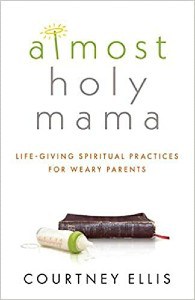
Receive the book Almost Holy Mama for your donation of any amount! Plus, receive member-exclusive benefits when you make a recurring gift today. Your monthly support helps families thrive.
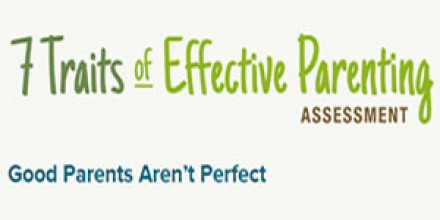
There's no parenting formula to follow, but there are ways you can grow every day. This assessment gives parents an honest look at their unique strengths, plus some areas that could use a little help.
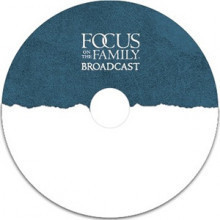
Visit our online store and purchase a CD of today's program for yourself or to share with a friend.
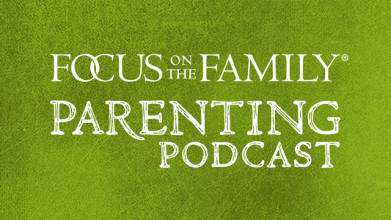
The Focus on Parenting Podcast provides moms and dads with practical guidance for improving their parenting skills and raising children who thrive.

This article outlines biblical practices that will improve your “spiritual fitness.”

Bring biblical principles to life with just the right balance of fun, faith, and imagination through Adventures in Odyssey.

You may talk about prayer and study prayer, but do you ever ask God to teach you how to pray?

What do we do when there is nothing to do? Jesus will meet us at the bottom of our lifes.

This blog post illustrates why being nice is easy to do, but kindness costs us something.

Can you imagine the freedom that would come to our hearts from having full confidence in the love of Christ? Would it help us love better?

We can find one of the best pictures of spiritual gifts way back in the second book of the Bible.

This discussion offers a preview of Volume #16 “Cultures in Conflict” from the That The World May Know video series, available below.

Debra Fileta will help couples better understand the four seasons of healthy relationships, what to expect during each one, and how to carefully navigate them for a stronger marriage. (Part 1 of 2)
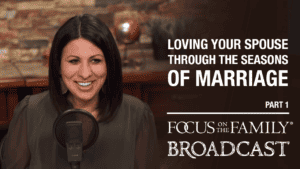
Debra Fileta will help couples better understand the four seasons of healthy relationships, what to expect during each one, and how to carefully navigate them for a stronger marriage. (Part 1 of 2)

Larnelle Harris shares stories about how God redeemed the dysfunctional past of his parents, the many African-American teachers who sacrificed their time and energy to give young men like himself a better future, and how his faithfulness to godly principles gave him greater opportunities and career success than anything else.

Amy Carroll shares how her perfectionism led to her being discontent in her marriage for over a decade, how she learned to find value in who Christ is, not in what she does, and practical ways everyone can accept the messiness of marriage and of life.

Jonathan McKee offers parents practical advice and encouragement in a discussion based on his book If I Had a Parenting Do Over: 7 Vital Changes I’d Make.